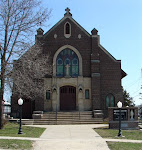This article was recommended by Father Pisut.
The New Missal: Disaster or Opportunity?
Fr. Rob Johansen has a very interesting article up on InsideCatholic.com wherein he examines the question of the debate which has surrounded the new English translation of the Roman Missal. An excerpt:
I have observed that "something more" before, writing and speaking about what I describe as "ideologized" liturgy -- that is, liturgy being made to bear ideological burdens that are extrinsic and, in many cases, inimical to it. The highly charged language of many of those objecting to the new Missal is frequently ideological: When I see words like "archaic" and "tyrannical," and phrases like "a great step forward" or "a major step backward," being used in complaints about the Missal, I suspect that the train of thought is carrying heavy ideological freight.
I use "ideology" here in the circumscribed manner of political theorists like Michael Oakeshott and Russell Kirk: to refer to the political fanaticism that results from elevating an abstraction to an absolute, all-explaining and all-encompassing concept, and making everything, including persons, subordinate to that concept. It is to take political concepts and impulses and make them serve ends that are properly religious.
One of those ideologies most prevalent in American society today, even among Catholics, is egalitarianism: the belief in a radical equality that seeks to level all differences and distinctions between persons. It is true that we are all equal in the eyes of God, but there are distinctions between the members of the Body of Christ. The Church, then, is hierarchical in its very nature, and its liturgy reflects that.
The ecclesiastical egalitarian seeks to demolish those hierarchical elements of the Church's life, wanting instead to subsume all under the abstraction of Equality. This outlook informs comments like those of one priest at "What If We Just Wait?" who asked, "Why have we wasted all this time and money and energy on 'egotistical' improvements?" Another commenter sees the new Missal as evidence of "elitism," saying "Liturgy is the work of the people rather than just liturgical elites." In an egalitarian worldview, any exercise of hierarchical authority is condemned as elitism or oppression.
To continue reading click here: New Liturgical Movement


